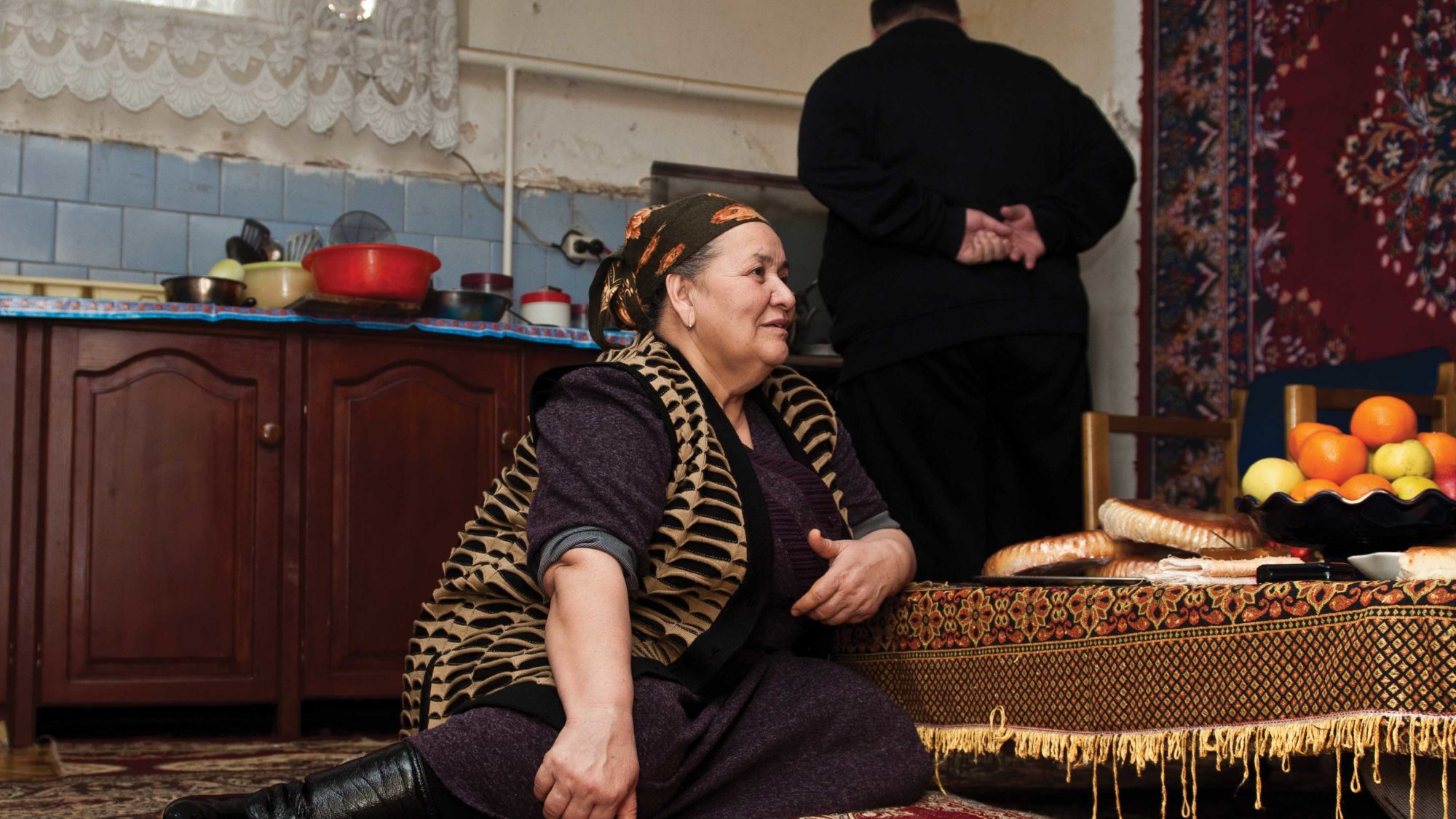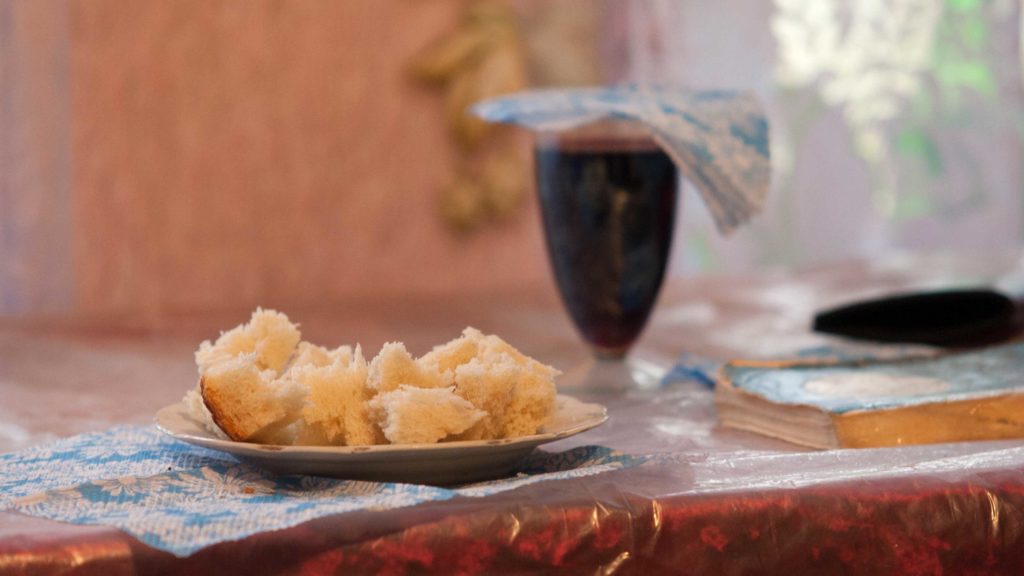
Old men coughed and toddlers squirmed as the cup was passed from person to person, up and down the rows of the Russian Baptist church. The babushka next to me took a sip and then turned toward me. With one hand I took the chalice of red wine, and with the other I took the little white cloth used to wipe a clean spot on the common cup. In my heart, I thanked Jesus for his cleansing blood. In my head, I prayed that he would make the cup clean too.
A common cup for the Lord’s Supper was as foreign to me as the red wine inside it. Grape juice in plastic, thimble-sized cups, and tiny cracker squares served as quickly as possible by the deacons: these were symbols of this ordinance to me. From my American cultural perspective, the Lord’s Supper was carried out in clearly defined ways, which looked different from the way my Russian brothers and sisters celebrated it.
This experience in another culture took me outside my comfort zone, but in moving beyond the familiar, my assumptions were challenged. I began to think more deeply about the ways we experience the Lord’s Supper as a community of faith. How do our choices about when, where, and how we observe the Lord’s Supper reflect its meaning? What was Jesus wanting us to grasp through these beautiful symbols of his body and blood?
An earlier event among an unreached people group in Central Asia had also raised fundamental questions in my mind about the way church traditions are planted in new cultures. I wondered, “How do we help young believers get to the heart of Jesus’s teachings?”
New Wine
In early 1992 there were very few believers among the Muslim peoples of the Central Asian country where we were serving. As those believers began to gather into churches, church planters faced the challenge of helping these young Christians understand what it meant to be the body of Christ. This included teaching them to observe the Lord’s Supper.
After baptizing fifteen new believers in a public pool, our small church-planting team encouraged the young church to read in Scripture about the Lord’s last supper with his disciples before his crucifixion. We asked them to pray about what following Jesus’s command to “do this in remembrance of me” would look like in their culture.
Through his brokenness, we are made whole. And despite our differences, he makes us one together with him.
We had no idea what to expect. When and how would our new brothers and sisters in Christ celebrate the Lord’s Supper? What might they see in Scripture that we did not?
This fledgling church was one of the first among this people group. Although many churches would emerge after them and define their church traditions in different ways, this group had the privilege and responsibility that came with being among the first.
They made several choices that diverged from our own tradition. First, they decided the Lord’s Supper should be part of a meal. As a group that met in a home—and as a culture that places high value on hospitality—they could easily incorporate a meal into their gathering, just as they saw pictured in Scripture.
Secondly, rather than using grape juice or wine, they chose pomegranate juice. Wine was a drink so abused in their culture that these believers thought pomegranate juice, called “the blood of the earth,” was a better choice for their celebration.
Third, prior to the Lord’s Supper, they decided to wash each other’s feet. The foot washing was the biggest surprise to me. The church separated into groups of men and women. Then, each person took a turn washing the feet of the person next to him or her. A young woman named Alma washed my feet. When she finished, she grabbed me in a huge hug and exclaimed, “Now you are a part of me!”
The Scripture that had been read before the foot washing immediately came to mind. Jesus told Peter that unless he allowed Jesus to wash his feet, Peter would “have no part” with him (John 13:8). Alma had heard this passage and interpreted it to mean, “If you let me wash your feet, you are a part of me.” For her it was more than a statement about Jesus’s service. It also spoke to the very nature of communion and community: as believers we are eternally connected through the sacrifice of Christ and through humility and service to one another.

Broken Bread
Yet another experience further deepened my understanding of the Lord’s Supper. There was a season in our family’s life and ministry when we embarked on an adventure to understand house church. First, gathering with our team of coworkers and later with local friends, we worshiped, studied Scripture, and broke bread together each week. Being church together involved sharing a meal, and usually it included the Lord’s Supper.
Suddenly a routine experience—the sharing of a meal at my own kitchen table—felt infused with holiness.
I didn’t realize the ways in which my young children were processing their experiences at house church until one ordinary evening at home. We were finishing dinner when my boys, ages five and three, asked for a piece of the round, flat bread sitting at the center of the table. I tore the loaf and gave a piece to Joshua, one to Aiden, and a little to myself. Joshua then looked across at Aiden and said, “This is Jesus’s body that was broken for you.”
I looked up, startled. Apparently Joshua had been paying attention during the Lord’s Supper, though he had not yet participated in it himself. I took in his words, spoken so naturally at the table. I looked at the piece of bread in my hand, and for a brief moment I remembered.
Suddenly a routine experience—the sharing of a meal at my own kitchen table—felt infused with holiness. Joshua called us to remember the greatest thing about our lives: that Jesus is with us in even the most ordinary places and times, and that his broken flesh heals our broken hearts. I remembered, and I wanted to keep remembering.
Perhaps Jesus chose what was ordinary and familiar for that very reason. He wanted us to remember often. He wanted us to remember together.
Eternal Meaning
Now my children are nearly grown. They have witnessed elements of Christian tradition lived out in several cultures. As they move out into the world, my prayer is that they will cling to Jesus and let his truth soak into every part of their lives, understanding that cultural expressions of church traditions might not always match their expectations, but the glory of Jesus is what matters.
Whether they worship with people who remember the Lord’s death with juice and crackers or wine and bread; whether they gather in pews or on mats around a table; whether they serve others by washing feet or making casseroles: may they remember Jesus who died to bring us life.
Through his brokenness, we are made whole. And despite our differences, he makes us one together with him. This truth is worth remembering and celebrating.
Sarah Alexander and her family serve with IMB in Central Asia. She has been writing about the region since 1991.

